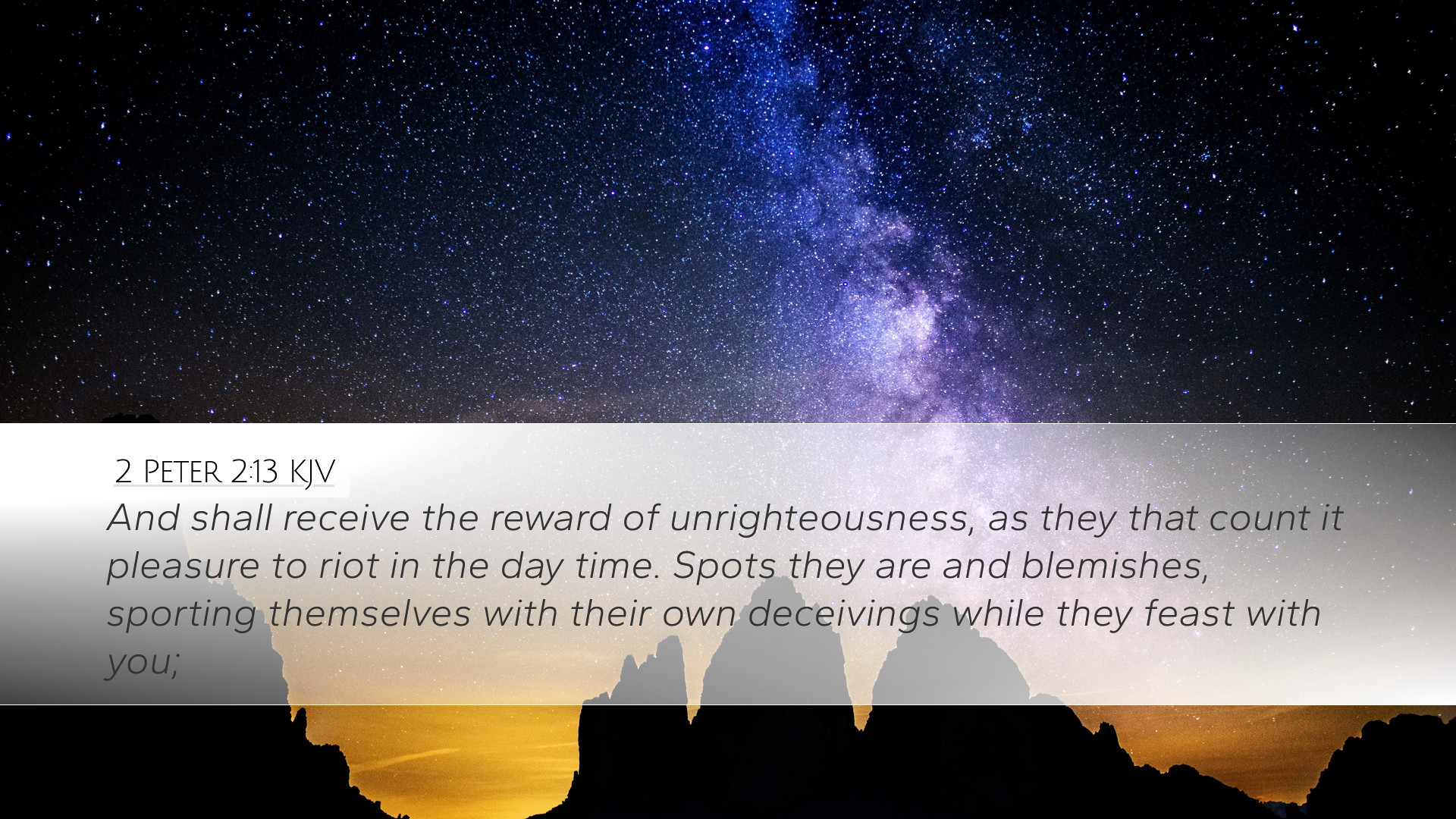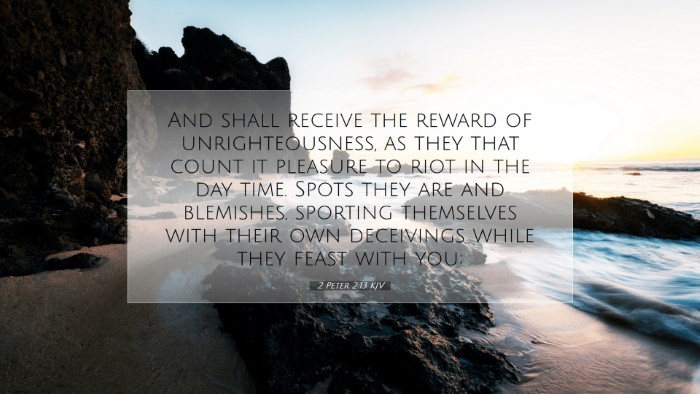Old Testament
Genesis Exodus Leviticus Numbers Deuteronomy Joshua Judges Ruth 1 Samuel 2 Samuel 1 Kings 2 Kings 1 Chronicles 2 Chronicles Ezra Nehemiah Esther Job Psalms Proverbs Ecclesiastes Song of Solomon Isaiah Jeremiah Lamentations Ezekiel Daniel Hosea Joel Amos Obadiah Jonah Micah Nahum Habakkuk Zephaniah Haggai Zechariah Malachi2 Peter 2:13
2 Peter 2:13 KJV
And shall receive the reward of unrighteousness, as they that count it pleasure to riot in the day time. Spots they are and blemishes, sporting themselves with their own deceivings while they feast with you;
2 Peter 2:13 Bible Commentary
Commentary on 2 Peter 2:13
Verse: 2 Peter 2:13 - "And shall receive the reward of unrighteousness, as they that count it pleasure to riot in the day-time. Spots they are and blemishes, sporting themselves with their own deceivings while they feast with you."
Overview
This verse from 2 Peter highlights the condemnation of false teachers and the consequences of their unrighteous actions. It serves as a stark warning to the believers about the nature and fate of those who indulge in sin and immorality openly, reflecting a broader theological emphasis on the judgment that awaits the unrepentant.
Commentary Insights
Addressing Unrighteousness
Matthew Henry elaborates on the idea of "the reward of unrighteousness," explaining that the term signifies not merely recompense in the human realm but an eternal consequence reflective of divine justice. As these false teachers indulge in their pursuits, they forget the inevitability of God’s judgment, which will come upon them as a natural outcome of their defiance against holiness.
Pleasure in Sin
Albert Barnes emphasizes the phrase "count it pleasure to riot in the daytime." This reflects an attitude of unabashed sinfulness that disregards moral standards. Day-time riot suggests a deliberate openness in their conduct, which is often considered shameful. Such behavior contrasts sharply with the expectations of Christian conduct, where light is used metaphorically to represent purity and righteous living.
Spots and Blemishes
Adam Clarke provides a significant insight into the metaphor of "spots and blemishes," noting that these terms are indicative of moral impurity and corruption. In the context of ceremonial law, both spots and blemishes were disqualifiers for offerings. Thus, the analogy serves to illustrate that these false teachers are unacceptable to God, being unclean and unfit for His holy purposes.
Deceivers Among Believers
As these teachers "sport themselves with their own deceivings while they feast with you," the implication is that they infiltrate the community of believers. Matthew Henry draws attention to the ease with which they blend in, marking the necessity for vigilance among Christians. The feasting symbolizes fellowship, highlighting how these deceivers can manipulate the environment of the church for their gain.
Theological Implications
Judgment and Accountability
This verse calls into focus the theme of divine judgment. Albert Barnes articulates the belief that every action has consequences, especially when it pertains to falsely leading God's people. The enjoyment of sinful behavior does not escape God’s scrutiny; rather, it invites greater judgment upon themselves as they lead others astray.
Call to Vigilance
For modern pastors and theologians, this passage serves as a sobering reminder of the inherent dangers that can exist within the church. Adam Clarke urges believers to remain on guard against such influences that masquerade as true teaching but essentially lead the faithful into moral decay. This vigilant testimony not only protects the community but also promotes personal holiness among believers.
Conclusion
In summary, 2 Peter 2:13 is a powerful warning against the false teachers who grace the assembly of believers with deceptive words and practices. The insights drawn from respected commentaries by Matthew Henry, Albert Barnes, and Adam Clarke provide a comprehensive understanding of the nature of unrighteousness, the significance of ethical living, and the ultimate accountability we have before God. Each believer, pastor, and theologian should heed these warnings and encourage others to build lives reflective of Christ's righteousness amidst a world filled with temptation.


